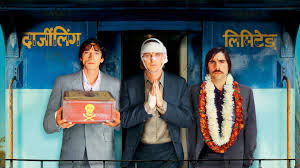 The Darjeeling Limited tells the story of three
brothers who are desperate for something. They don't know what that something
is, or where to find it, or even why they don't have it. But this desperation
leads them to take a journey by train through India. The oldest brother,
Francis, hopes this journey will not only give them a spiritual jumpstart
to happiness and fulfillment, but also will reunite the brothers with their
mother, who has been an absentee parent at best. They each distrust the others,
they lie, hide, sabotage, and fight each other, not recognizing that they are
pretty much all they each have (with exception of the middle brother, whose
wife is expecting a child), as their mother did not really ever want to be a
mother. As a result, their own adult lives are selfish, petty and manipulative.
They use their lives (bodies) for themselves, and not each other. All of this
stems from the reality that were not really wanted as children, and as adults
they continue to deal with that neglect, abandonment and maternal avoidance.
The Darjeeling Limited tells the story of three
brothers who are desperate for something. They don't know what that something
is, or where to find it, or even why they don't have it. But this desperation
leads them to take a journey by train through India. The oldest brother,
Francis, hopes this journey will not only give them a spiritual jumpstart
to happiness and fulfillment, but also will reunite the brothers with their
mother, who has been an absentee parent at best. They each distrust the others,
they lie, hide, sabotage, and fight each other, not recognizing that they are
pretty much all they each have (with exception of the middle brother, whose
wife is expecting a child), as their mother did not really ever want to be a
mother. As a result, their own adult lives are selfish, petty and manipulative.
They use their lives (bodies) for themselves, and not each other. All of this
stems from the reality that were not really wanted as children, and as adults
they continue to deal with that neglect, abandonment and maternal avoidance.What is the mother's (and then the brothers') view of life? (How do you know?)
Why are we (like this family) so inconsistent in our views of life?
Why might they have sought what they were looking for in a spiritual journey?
For what do you think they were looking?
Why do we use and manipulate people?
Why do we look for happiness, ecstasy, or euphoria in places that we know don't have the answers?
Why doesn't it matter that their mother doesn't see herself in the way the boys see her?
(Like it or not, your identity is not completely up to you...)
Verses to use in the discussion:Jeremiah 2:7; 2 Timothy 2:22; Ecclesiastes 2:1-11; Luke 8:14; 1 Timothy 6:17; Romans 12:1; 1 Peter 4:3-4; Leviticus 19:34